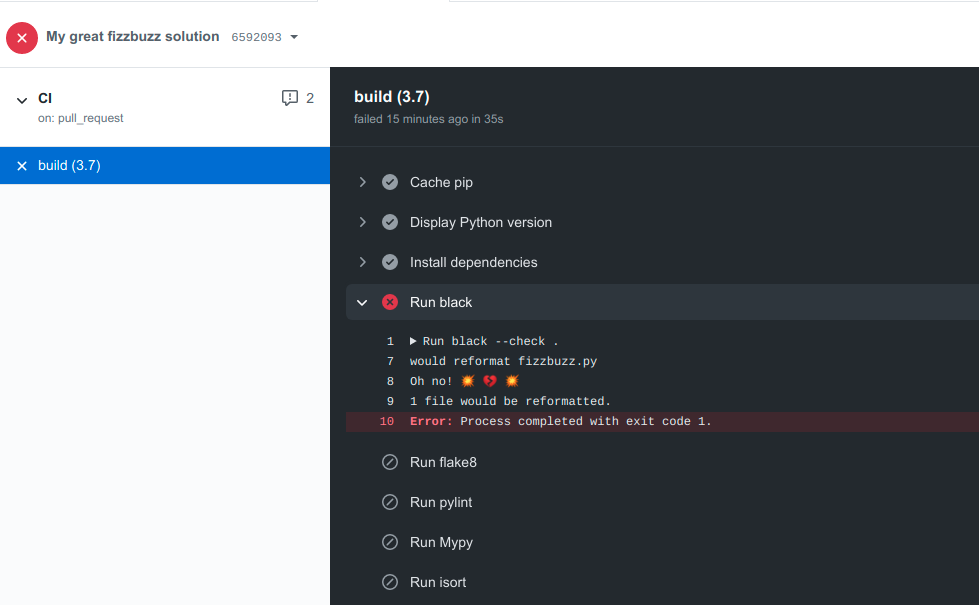III. FizzBuzz¶
OK, it is time to write some code!
Definition¶
Fizz Buzz problem is a task that sometimes people get during coding interviews. It goes like this (I take the definition from Joel’s book): ..
Print the numbers from 1 to 100, except that if the number is divisible by 3, instead print “fizz”; if the number is divisible by 5, instead print “buzz”; and if the number is divisible by 15, instead print “fizzbuzz”.
So, imagine we come up with great code.
import scipy
import pandas
import numpy
import matplotlib
from matplotlib import pyplot as plt
####### Here I start the solution to the fizz buzz problem #######
def fizz_buzz(n: int) -> str:
if n % 15 == 0: return 'fizzbuzz'
elif n % 5 == 0: return 'buzz'
elif n % 3 == 0: return 'fizz'
else: return str(n)
We were in a hurry, so we first imported everything that we usually import, made comments
to visually show where the code starts, and printed if-return statements on the same
line. Clearly, there is no newline at the end of file, who cares since the code is so great!
Actually, we do care because the code needs to be readable and beautiful, and we
decide that it is a good idea to impose structure on every pull request. Also, code must
pass linter checks and be formatted in a unified manner. It is possible to add all the
necessary checks that we want to impose in the ci.yml file that we created in the previous
section. Let’s say we add:
blackformatter of the codeisortto sort the imports in alphabetical orderflake8andpylintto inspect the code for conformity with good code practicesMyPyas a static type checker
Extended GitHub Actions file¶
That’s how the ci.yml file looks like now:
# This workflow will install Python dependencies, run tests and lint with a variety of Python versions
# For more information see: https://help.github.com/actions/language-and-framework-guides/using-python-with-github-actions
name: CI
on:
push:
branches: [ main ]
pull_request:
branches: [ main ]
jobs:
build:
runs-on: ubuntu-latest
strategy:
matrix:
python-version: [3.7]
steps:
- uses: actions/checkout@v2
- name: Set up Python
uses: actions/setup-python@v2
with:
python-version: ${{ matrix.python-version }}
- name: Cache pip
uses: actions/cache@v1
with:
path: ~/.cache/pip # This path is specific to Ubuntu
# Look to see if there is a cache hit for the corresponding requirements file
key: ${{ runner.os }}-pip-${{ hashFiles('requirements.txt') }}
restore-keys: |
${{ runner.os }}-pip-
${{ runner.os }}-
# You can test your matrix by printing the current Python version
- name: Display Python version
run: python -c "import sys; print(sys.version)"
- name: Install dependencies
run: |
python -m pip install --upgrade pip
pip install black flake8 mypy pytest hypothesis isort pylint
- name: Run black
run:
black --check .
- name: Run flake8
run: flake8 fizzbuzz.py
- name: Run pylint
run: pylint fizzbuzz.py
- name: Run Mypy
run: mypy fizzbuzz.py
- name: Run isort
run: isort --profile black fizzbuzz.py
Let’s now try to push the solution above to the repository. And we see that it fails on
the first check. When it fails it does not proceed to the next steps, but it turns out that
the code above for solving the FizzBuzz problem will fail on every check.

A better version of fizzbuzz.py¶
The code below passes all of the checks that we have imposed on it.
""" Function to solve the fizzbuzz problem."""
def fizz_buzz(num: int) -> str:
"""This is my great and neat function to solve the famous
Fizz Buzz problem.
:param num: That's the number which we want the answer for
:return: fizz, buzz, fizzbuzz or the number itself
"""
if num % 15 == 0:
return "fizzbuzz"
if num % 5 == 0:
return "buzz"
if num % 3 == 0:
return "fizz"
return str(num)
Now when we push it to the dev branch, pull requests could be merged into the main
branch since all checks are passed.
Catch the problem before committing¶
It might be that you want to learn that there are problems with your code (that is,
it does not pass a check that one imposed) before committing. Yes, you will run the tests
locally, but what if there is an additional point of control that does not allow you
to commit your changes unless all the checks are passed? It is called a Pre-commit hook,
and more on how to set it up in the next section: IV. Pre-commit hook.